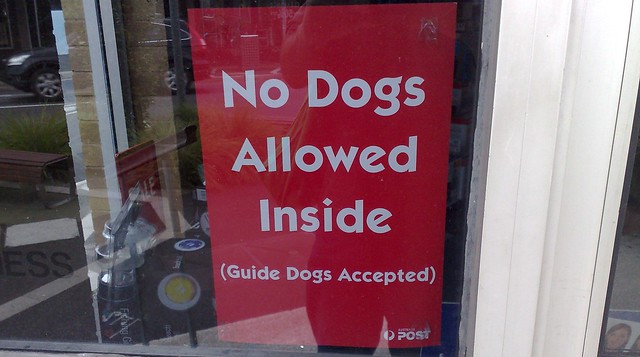Sometimes when I don’t have a blog post ready to go — either because I’m halfway through writing something, or I just can’t think of anything to post — I’ll instead post a photo or two that I’ve taken.
Here’s today’s.
I can’t help feeling that this sign would scan better if it said “excepted” instead of “accepted”. But I suppose it still works. It’s not just an Australia Post thing; I have recently seen the same wording in other shop windows.

Of course, not every word should be capitalised, But That’s Another Story.
10 replies on “Guide dogs accepted”
By luck more than anything “accepted” works and makes sense, but you just *know* they meant “excepted”.
Maybe they though excepted might seem ‘mean’ or something if it was misinterpreted. Though why bother have this sign anyway – since when were you allowed to take a dog into any store (other than maybe pet store and vet) other than a guide dog?
There used to be a road sign on the traffic island outside Windsor railway station which said “Keep Right – Emergency Vehicles accepted” (I guess because of the Fire Station there), which always used to irk me. Luckily someone vandalised it and it was never replaced.
Daniel, it wouldn’t just be ‘better’, it would be correct, whereas, it is now wrong.
The mind boggles here! Are they implying that guide dogs are accepted for posting!! or maybe just for licking stamps… :-)
How about “Guide dogs are welcome.”? This is how I would word the sign. I don’t see what harm a well behaved dog does in a public place. Most dogs are more well behaved and pleasent to be around than many people I have encountered in public.
@Jed, but that’s not the key message.
(Well-behaved dogs might do no harm, but how do you tell people only well-behaved dogs are welcome? What defines “well-behaved”?)
Those to whom this sign applies are unable to read it. As such, it’s a rather pointless exercise. Kind of like those anti-piracy messages at the start of purchased DVDs.
@Peter, ah yes, but it’s not just for the blind. It’s also for the ignorant masses who might see a guide dog going in and not know that they’re allowed.
Daniel wrote:
“(Well-behaved dogs might do no harm, but how do you tell people only well-behaved dogs are welcome? What defines “well-behaved”?)”
Ohhhh, can you just imagine the arguments? It’s rather like the issue with small children that crops up in the media now and again. In theory, children are allowed nearly everywhere, with a few obvious exceptions such as movies with an adult rating, or sex shops. In practice, some children are beautifully behaved and a pleasure to be around; some children try hard and may lapse occasionally, but are generally okay; and some are selfish, obnoxious, uncontrollable little horrors. But no one’s own child is ever the little horror. The parents of such children often get really angry if you dare suggest their child is disrupting other people’s enjoyment and that the child might be happier if the parents took them elsewhere.
Now imagine if that applied to dogs too. “What do you mean, you’d rather not have dogs here? Are you some kind of dog hater? It’s a free country! I have the right to take my dog anywhere! My dog isn’t a problem! You’re the one with the problem! Try being a bit more tolerant!”
No, I think I prefer the blanket rule of “no dogs except guide dogs”, no matter how unfair it may be to all the well-behaved dogs out there. And I too would prefer it if Australia Post would spell “excepted” correctly.
“Those to whom this sign applies are unable to read it. As such, it’s a rather pointless exercise.”
No, you are wrong. The sign applies to non-blind people with dogs, and they CAN read it, and they have to stay out of the shop.
If a blind person can’t read the sign and walks right in with their guide dog, then they are OK.